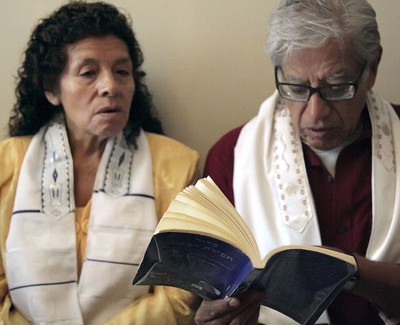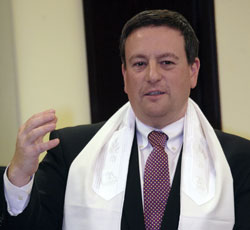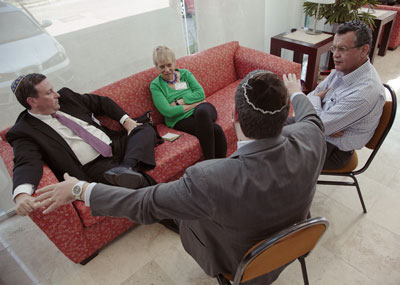Wider World
Feature
Coming Home

Edgar Mendez, a 59-year-old lawyer, arrived in Mexico City from Neiva, Colombia, where he used to be a Catholic priest.
Charton Baggio, 45, a motivational speaker, came from Brasília, Brazil, where, not long ago, he was part of the leadership of an Evangelical church.
Yenle Zuleyma Santiago Garcia of Mexico City, a 26-year-old, was an Evangelical Christian when she began reading about the foundation of the church.
Raul Martinez Aguilera, 38, a translator, also of Mexico City, was a Seventh Day Adventist and strict Sabbath observer.
They and about 30 others from Brit Braja Worldwide Jewish Outreach, an online Jewish congregation, gathered in Mexico City last summer for a conference. The theme of the conference was Jewish diversity and its purpose was to bring the widespread members of Brit Braja together to talk, learn and finally celebrate a Shabbat face to face.
“We had ‘met’ online at [Brit Braja’s weekly] Sabbath services,” said the soft-spoken Mendez, “but had never been in each other’s presence and experienced the comfort and joy of physical community.”
“Because some of us live in cities or towns where we have no other Jewish connections, we are excited to eat together, learn together, share stories and information, and remain in contact in the future,” the ebullient Baggio chimed in. “And Brit Braja offers us the opportunity of a lifetime to study and hopefully convert to Judaism, the religion of our hearts.”
A few of the conference attendees had already undergone conversion to Judaism when they met with Rabbi Jacques Cukierkorn, founder of Brit Braja, in Mexico City and Guatemala City over the past few years. Six, including Veronica Padilla and her daughters, were ready to complete the conversion process in Mexico City by facing examination by a beit din and immersing themselves in a mikve.

Most American non-Jews who wish to convert have a wide variety of choices, from Orthodox to Jewish Renewal, some of which present fewer hurdles than others. And once they have converted, most find a welcoming congregation. But in Latin America, where Jewish communities are often small and insular, the path for would-be converts often leads to rejection.
Although each attendee’s story is different, there is a common thread: On discovering that Jesus was a Jew they all became interested in Judaism. The more they studied, the more questions they raised about church history, precepts, practices and, in the words of Mendez, “whether Jesus was mortal, and not God.” Eventually they discovered Brit Braja, under the guidance of the Brazilian-born Cukierkorn, spiritual leader of Temple Israel of Greater Kansas City, Kansas, who has long been active in outreach to people in Latin America with an interest in Judaism—including many who believe they are descended from Jews forcibly converted during the Inquisition. The rabbi’s warmth, charisma and sense of humor, not to mention his own Latin roots, make members of his online community feel welcome. Under his supervision, they undertake the study of Torah, Jewish custom and prayer.
“I love teaching, and the earnestness and sincerity of those who want to convert inspires me,” said Cukierkorn, 46. “Over the course of my career, I have probably performed 500 conversions. My goal is not to make the world more Jewish, but more human and humane.”
Mendez said he had always been interested in biblical exegesis. “When I became a priest,” he said, “I continued reading about the Jewish roots of Christianity, the history of the church and the Jews, the Inquisition and the Sefardic origins of some of my relatives’ surnames. I freely spoke about the fact that Jesus was a Jew, not God, and he didn’t start a new religion; he taught about the need to observe the Torah.
“The bishop was not pleased,” Mendez added. “‘Don’t celebrate the liturgy anymore,’” he quoted the bishop as eventually telling him. “I understood that I was excommunicated and, at the same time, free to answer God’s calling as Abraham did.”

Baggio, who came from a nonpracticing Catholic family in Brazil, joined an Evangelical church in his early twenties. When a teacher in the church said there was something besides the New Testament, he had never heard of the Hebrew Bible or Jews. “In 40 days I read the whole Bible from Genesis to Apocalypse,” Baggio recalled. “I saw many conflicts between what the pastors said and what was written. Why did Jesus observe Sabbath? What about circumcision?”
Baggio and his wife went to a synagogue in Brasília but, he said, they didn’t feel welcome. “So we began to live as Jews in our own house…. My life changed when I met Rabbi Cukierkorn online and joined Brit Braja. Now I run their website. Tomorrow is my conversion. But even if I am rejected, I already know who I am. Ani Yehudi. I am a Jew.” He passed.
In Brit Braja, we practice non-exclusive Judaism,” observed Aguilera, who attended the conference with his wife, Margarita. “It doesn’t matter if we know that our ancestors were crypto-Jews, like some of us, or if we have no knowledge of our ancestors, like others. What matters is that we have become Jews or are in the process of converting to Judaism. And we are open to everyone.”
Most of the members of Brit Braja are Spanish or Portuguese speaking—Cukierkorn is fluent in both languages—but anyone can join the synagogue. In addition to Mexico City, Brit Braja has Mexican groups in Guadalajara, Morelia and Saltillo, as well as in Bogotá, Colombia, and Brasília. During the conference in Mexico City, the rabbi received e-mails from prospective members saying they would join if gays were excluded. He replied that gays were not excluded; two conference speakers were advocates of gay rights. Another presenter talked about the discrimination converts and prospective converts experience from established Jewish communities based on their skin color (many are mestizo, of mixed European and Amerindian heritage) and economic status. All agreed that their response should not be anger but, rather, a determination to keep their synagogue membership open to all.
The words “personal rejection” certainly applied to attendee Roberto Wong, another convert, whose name recalls a Chinese ancestor who came to Mexico to work on the railroads. Just before the conference began, Cukierkorn officiated at Wong’s wedding, which took place under a huppa and ended with Wong and his bride, Rebecca Rosado, each breaking a glass as guests called out, “Mazel tov.” Wong’s parents, Evangelical Christians, refused to attend the festivities because they objected to the Jewish ceremony.
At the wedding, the hazzan was Israel Rocha, who leads the small branch of Brit Braja in Mexico City. When Rocha grew up, there were family stories about Rocha’s mother’s ancestors being Jews from Yemen. He thought Jews only existed in the past, and was surprised to learn there were many branches of Judaism. He also went to a local synagogue and felt rebuffed.
Rocha and his mother, Rebecca Rocha, studied online with Cukierkorn for two years and were preparing to meet him in 2008 in Guatemala City to undergo conversion. But Rebecca Rocha’s health prevented her from making the 24-hour bus trip, so the son went alone. Cukierkorn not only performed the conversion, but also surprised Rocha by informing him there were other people in Mexico who were studying and longed to convert.
When Rocha returned to Mexico City and told his mother what had happened, she said he should continue studying and teaching others. When he suggested he could meet prospective converts in a café, she insisted that the meetings take place in their home, and she cooked for and welcomed those who came to her house. In December 2008, Israel Rocha had a group of six, including his mother, ready to convert. Cukierkorn said he would arrive on December 17 for the conversion ceremonies.
On December 8, Rebecca Rocha, who was in her midfifties, suffered a cerebral hemorrhage. Doctors said she would die within 24 hours. “When the rabbi arrived eight days later, she was still alive, although unconscious,” Israel Rocha said, crying at the memory. “The first conversion he performed was hers. He did it at night. The next morning…she died. I somehow believe she knew she died Jewish.”
“I didn’t know of any procedure for conversion of an unconscious person,” Cukierkorn added. “It was probably not totally in accordance with halakha, but I did what was needed for the family.”
Rocha said his mother’s life was about teaching and helping others and that she was the inspiration behind the Brit Braja community in Mexico City, which today has 40 members. “When people started coming to our house, I realized that we were liberal Jews, but there was no liberal siddur in Spanish,” he said at the conference’s Shabbat service. “My mother said we needed to make one. So I created it, bit by bit, and finally published it last year. We rented a small townhouse, which is now our synagogue and the place where we teach our children.”
He opened the siddur and pointed to the words on the front page: “Dedicated to my mother Clara Gonzalez Ruiz (Rivka bat Abraham ve-Sara).”
Several of the new converts said that as Rocha spoke, they could feel his mother’s presence.







 Facebook
Facebook Instagram
Instagram Twitter
Twitter
Susanna Levin says
Lovely article, but too bad the people involved didn’t have a halachic conversion.